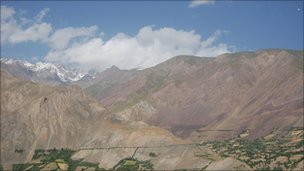
Tajikistan Cedes Disputed Land to China
Publication: Eurasia Daily Monitor Volume: 8 Issue: 16
By:

Tajikistan has agreed to cede a fraction of its territory to neighboring China in a bid to settle a border dispute that dates back more than a century. On January 12, the lower house of the Tajik parliament voted to ratify the 2002 border demarcation agreement, handing over 1,122 square kilometers (433 square miles) of mountainous land in the remote Pamir Mountains (www.asiaplus.tj, January 12). The ceded land represents about 0.8 percent of the country’s total area of 143,100 square kilometers (55,250 square miles).
Tajik Foreign Minister, Khamrokhon Zarifi, hailed the border deal as a “great victory” for Tajik diplomacy, noting that China had previously claimed about 20 percent of the country’s territory (Shabakai Yakum TV, January 12). The territorial dispute dates back to 1884, when a border demarcation agreement between the Qing dynasty China and Tsarist Russia left large segments of the frontier in the sparsely populated eastern Pamirs without clear definition. At the time of independence, Tajikistan inherited three disputed border segments, constituting about 28,500 square kilometers (11,000 square miles), which China and the Soviet Union had been unable to resolve. In 1999, Tajikistan and China signed a border demarcation agreement, defining the border in two of the three segments. Under the 1999 deal, Dushanbe ceded about 200 square kilometers (77 square miles) of land to Beijing (https://www.ca-oasis.info/oasis/?jrn=109&id=817).
Negotiations over the largest contentious border segment ended in 2002, after signing supplementary bilateral agreement in which Tajikistan agreed to cede 1,122 square kilometers of border land (www.xinhuanet.com, May 17, 2002), or about four percent of the territory that Beijing had claimed. The deal was not submitted for parliamentary ratification immediately after its signing, possibly because the Tajik leadership feared repeating the Kyrgyz scenario where the 1999 decision to cede land to China had led to massive public outcry and an attempt to impeach the then President, Askar Akayev. Nevertheless, for China the deal symbolized the “final and complete solution” of its border dispute with Tajikistan (https://www.mfa.gov.cn/eng/wjb/zzjg/tyfls/tyfl/2626/t22820.htm).
The recent ratification of the agreement by the lower house of the Tajik parliament in effect formalized the 2002 deal. The agreement must now be ratified by the upper house, but this is a mere formality given the Tajik president’s full control of the parliament. Suhrob Sharipov, the Director of the Tajik government-affiliated Centre for Strategic Research, argues that the deal with China is a significant success because it ensures the inviolability of the country’s borders for years to come. Experts believe that the resolution of the border dispute will further enhance cooperation between the two countries. China is Tajikistan’s largest investor, particularly in the energy and infrastructure sectors, and is among the country’s major trading partners. Aleksey Vlasov, the head of the Post-Soviet Studies Centre at Moscow State University, maintains that Dushanbe regards Beijing as a key source of foreign investment and is paying back by ceding a small part of its territory (Izvestiya, January 14).
The deal with China prompted unusually high levels of debate in the Tajik parliament. Muhiddin Kabiri, the head of the Islamic Revival Party (IRPT), has fiercely criticized the agreement with Beijing, describing it as a “defeat” rather than victory for Tajik diplomacy. According to Kabiri, the deal violates the country’s constitution, which contains explicit provisions for the indivisibility of the Tajik state (www.avesta.tj, January 13). In contrast, head of the increasingly pro-government Communist Party (CPT), Shodi Shabdolov, praised the deal. At the same time, he denounced the secrecy that surrounded the agreement with China (www.asiaplus.tj, January 13).
It is unclear where exactly the land will be ceded to China and whether it is populated. Beijing had been claiming the area to the south of the Uz-Bel Pass, including the Rangkul Lake, in mostly arid, high mountains in Tajikistan’s eastern Murgab district. The district is only sparsely populated, mostly by Kyrgyz nomads.
Tajik academician Rahim Masov, who was a member of the Sino-Tajik border delimitation commission believes that Beijing is “well aware” of the natural deposits that the acquired land contains. Tajik experts and geologists say the Sarikul Valley which encompasses the ceded area is rich in gold and has some deposits of other rare metals, including uranium, nickel, and mercury. There are also significant salt and fresh water reserves. Muhiddin Kabiri notes that the ceded area might also have geopolitical significance for China (Deutsche Welle, January 17). Tajikistan borders on China’s western Xinjiang province, which is riddled by ethnic tensions, separatism and religious extremism. China has recently been building roads to link Xinjiang with Tajikistan in a bid to increase its imports and develop the western region.




